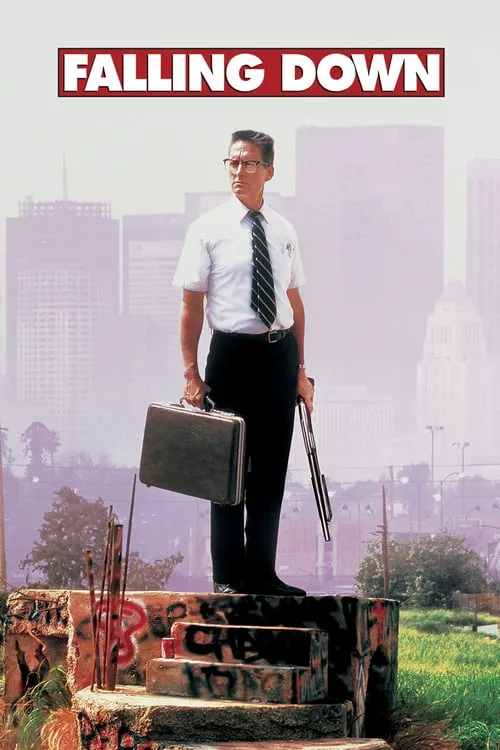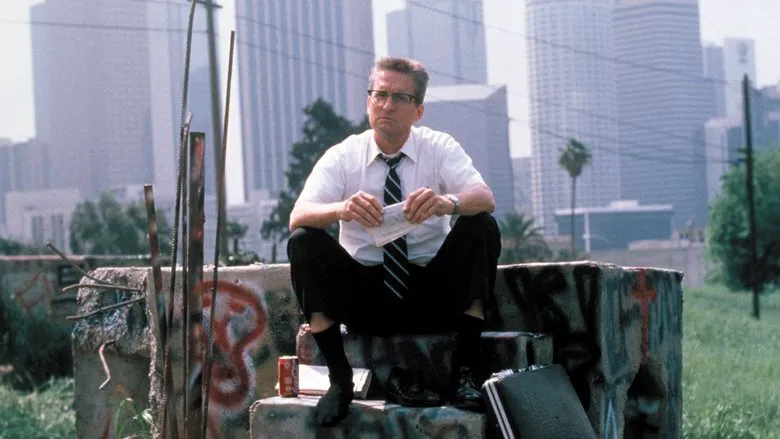Falling Down

Plot
The movie "Falling Down" is a 1993 American drama film directed by Joel Schumacher and written by Ebbe Roe Smith. The film stars Michael Douglas as a character named William "D-Fens" Foster, an ordinary working-class man living in Los Angeles. The plot revolves around Foster's increasing frustration with the seemingly incompetent and apathetic society around him. The film begins with William Foster, a divorced father, waking up on the morning of a fateful day in his apartment overlooking the San Pedro Freeway in Los Angeles. His divorce has been finalized, and he is struggling to cope with the loss of contact with his six-year-old son, which he was granted during their divorce. As he gets dressed and gets ready for the day, he is met with the sounds of a noisy traffic jam, further exacerbating his already heightened state of anxiety and stress. On his way to pick up his son, Foster is forced to divert his route due to the heavy traffic and roadblocks that have been set up to accommodate a new highway lane. As he navigates the congested streets, he encounters the various flaws he sees in society that contribute to his growing frustration and anger, such as reckless drivers, lazy construction workers, and corrupt authorities. Foster's frustration reaches its boiling point when he is unable to access the freeway due to these obstacles and, in a state of rage, he decides to take matters into his own hands. He abandons his car and begins a walking journey to the Santa Monica pier, a place he wants to visit before his child is turned over to the custody of his ex-wife, Beth. The walking serves as a metaphor for his journey to confront the societal norms that he believes are suffocating him. As Foster walks, he becomes increasingly unhinged and starts picking fights with people who embody the flaws in society he sees. He targets a Vietnamese street vendor and a convenience store owner, both of whom he perceives as taking advantage of the system. The violence escalates, and Foster becomes increasingly reckless, eventually causing a disturbance at a convenience store, where he brutally assaults a convenience store owner. Meanwhile, a detective named Prendergast (played by Robert Duvall) is searching for a suspect known as "D-Fens," who is linked to the violence that has taken place throughout the city. Foster's increasing notoriety catches the attention of the media, as his actions are widely reported on the news, further fueling the sense of chaos and panic. Prendergast, despite his gruff demeanor and lack of empathy, eventually begins to show a glimmer of understanding and compassion for Foster, particularly when he visits Foster at a local park and starts to understand the circumstances that have driven him to this state of desperation. The relationship between Foster and Prendergast takes a humanizing turn, as Foster's anger gives way to despair and loneliness. Upon reaching the Santa Monica pier, Foster becomes disillusioned when it is closed due to the Memorial Day celebrations. In a heart-wrenching scene, Foster reveals his true feelings of despair and loneliness to a stranger, highlighting the tragic consequences of his actions. The stranger, a homeless man, commiserates with Foster and shares his own experiences, bringing a sense of empathy and understanding to the film. As Foster is taken into custody by the police, Prendergast is left to ponder the events that have transpired and reflect on his own role in the events. Despite his tough exterior, Prendergast shows a level of compassion for Foster, acknowledging that his actions were born out of a desperate cry for help. Through the film, Schumacher effectively humanizes his protagonist, portraying Foster as a sympathetic and complex character who has been pushed to the edge by the societal norms he sees as corrupt and oppressive. The film's climax features a poignant conclusion, as Foster begins to come to terms with his actions and the consequences of his behavior. Foster's transformation from an angry individual to a human being in need of help underscores the film's commentary on the need for empathy and understanding in contemporary society. The film's exploration of themes such as toxic masculinity, anger, and desperation resonates with audiences to this day, cementing "Falling Down" as a thought-provoking and unforgettable classic of American cinema.
Reviews
Ellie
After watching it twice, Douglas's eventual "Falling Down" actually dilutes the heavy sense of social critique.
Autumn
This is a true "Fuck you very much" story, just like the line from the movie. Everyone just wants to fuck each other over, and in the end, no one knows what exactly fucked them all together, a debt with no clear debtor. This reminds me of "Wild Tales" from last year; you never know when your world will fall apart. Some people's breakdowns are tragedies, some are farces, but many people's breakdowns become silent films.
Carson
I'm fucking pissed off too. That's the raw nerve this movie hits, and hits *hard*. It's not just about a guy snapping, it's about the simmering rage so many of us feel, watching the world go to shit and feeling powerless to stop it. This ain't subtle, but sometimes you need a sledgehammer to break through all the bullshit.
Alexa
The most hateful thing about this world is: no one is wrong, yet everyone has ample reason to be. No one is a villain, and you can't truly hate anyone.
Autumn
Inflation, gang violence, robberies, food quality, racial discrimination, economic recession, government corruption, mass unemployment, healthcare system flaws, gun control... The man is falling down, but in reality, the movie implies that American society is falling down too. And when people point fingers at society, it asks, "Am I the bad guy?" Also, I genuinely believe that Michael Douglas' performance in this film is worthy of an Oscar.
Recommendations





